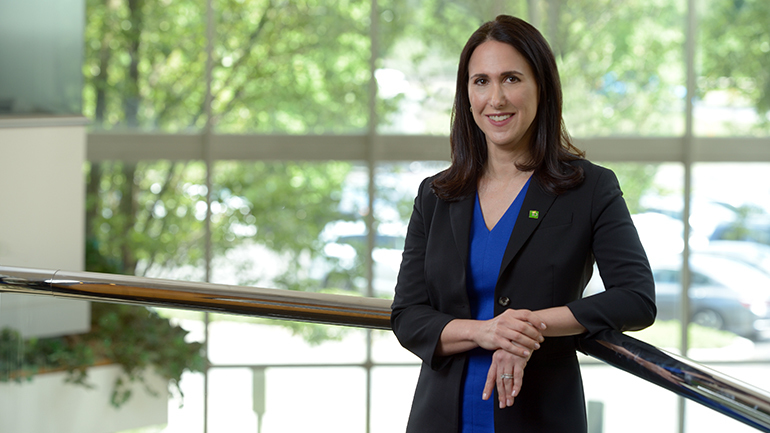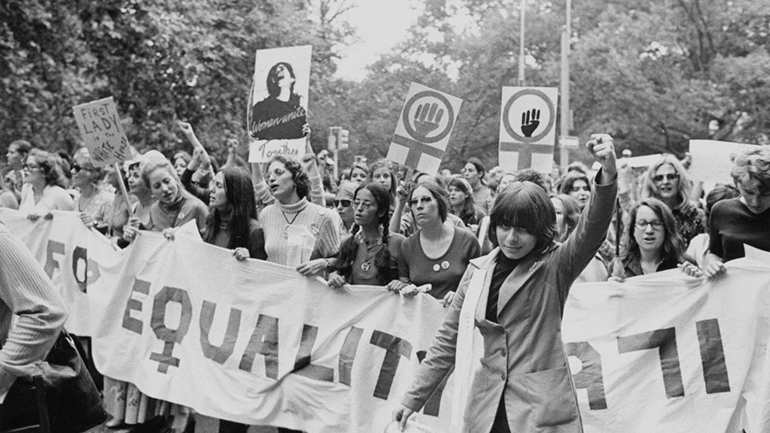Advice for women in the workplace
It's been over 100 years of progress for women since the Nineteen Amendment was certified into the U.S. Constitution, solidifying the right for women to vote.
While we celebrate Women's Equality Day and a century of incredible achievement by women on this date, the goal of full equality remains.
Marla Willner, TD's Head of Corporate & Specialty Banking and Executive Chair of the Women in Leadership (WIL) Committee, talks about ways to make sure that all women have opportunities to reach their career potential.

Why is Women's Equality Day so important?
Women's Equality Day reminds us of how hard women have fought for a seat at the table and how much we have won. A hundred years ago, women were not allowed to vote in this country, and now we have women running for the highest offices.
Women weren't allowed to have their own credit cards as recently as 1973, and now look at us. Still, we have a long way to go to achieve true equality. It is important that we continue to fight, especially for marginalized women. Women's Equality Day reminds us that change is possible so long as we work for it.
What advice would you give women looking to take on leadership positions?
It is never too early in your career to start thinking like a leader. That's something I have been trying to emphasize—you can be a leader at any point in your career. Leaders look for ways to help without being asked, and they help their teams.
There can be an image as a leader as someone who issues orders, but it's more about building consensus and helping the team get on the same page. That is something that you can do at any level.
It is also never too soon to start networking. By reaching out to colleagues and people outside of your network, you can learn more about other people's careers and identify paths that might be interesting to you.
You can also identify opportunities to take on leadership positions early. Listen for problems that people are facing as you talk with them and ask yourself if there is a way that you could help them solve that problem. Taking on added responsibility or helping connect people with each other is a great way to start building your leadership skills.
How have you committed to helping women in your work?
The first and easiest step is to help the women around us in our own circles. Within TD, I am the Chair of the Women in Leadership Committee (WIL). WIL looks to lead the conversation around women in the workplace, confronting common biases and sharing personal experiences.
We are currently holding a three-part panel series to discuss different aspects of women's wellness in the workplace to talk about how the pandemic has impacted women. By having these conversations at the bank-wide level, I hope to do my part to help other women succeed.
In addition to helping the women immediately around us, I also believe we need to challenge ourselves to reach outside of our comfort zone to help the most vulnerable. I am currently Treasurer for the Women's Prison Association (WPA). WPA works with women at all stages of their criminal justice involvement and works to help them with basic needs like housing and jobs.
This year, COVID-19 hit the finances of many non-profit organizations hard, and WPA was no exception. My financial skills ended up being valuable in these lean times, and it felt great to be able to help in the face of all the uncertainty and fear caused by the pandemic.
It is so important for each of us to do whatever we can—however small—to use our skills on the behalf of the vulnerable.
As a leader, how do you work to promote diversity and inclusion?
I challenge my teams and leaders to have the uncomfortable conversations to make sure they know the challenges their teams are facing and teaching ourselves about the issues so we can better support each other.
Often leaders are extremely hesitant to discuss race, but we lead diverse teams, and we serve diverse customers and communities. We need to be sure to talk about the issues that they face. The pandemic disproportionately impacted communities of color, and it is our job and responsibility to help do what we can to help.
We have been having panels of executives provide insights to promote colleague wellbeing.
Having the conversation is the first step.
- Diversity is core to the culture at TD Bank, and the diversity of our workforce is one of our greatest strengths. We have been named one of the Top 50 Companies for Diversity by DiversityInc for three consecutive years, which is one of the awards I am most proud of.
- We are always looking to make sure we continue to recruit diverse talent at every level. We have a sophomore intern program focused on diverse candidates to help us attract more qualified talent. I'd encourage young people interested in financial services to take a look at the program.
There's a lot of uncertainty and disruption right now, but that also means there are new opportunities. How do you take disruption and turn it to your advantage?
There is a time right after any disruption where people really look for leadership. Every problem creates the opportunity to be the one to solve it, and leadership can truly come from anywhere.
During the pandemic, we've had to transition more than 500 employees to work from home almost overnight. I could never have done this without serious leadership from my entire team. They have shown such innovation in how they connect with each other, and I've been blown away by the teamwork.
More than three hundred people from U.S. Corporate and Specialty Banking (CSB) volunteered to help with the Payment Protection Program loans, for example, and we saw incredible ideas for engagement coming from the team. One team even came up with the idea of having Karaoke Calls and Trivia Nights to help keep us all engaged and connected.
On the business side, we immediately began to look for new opportunities to support our customers. We helped them open new liquidity lines to better adjust to the increased uncertainty right now. We stood by them through the turmoil.
How did the pandemic change or challenge your leadership style?
I've always tried to be an empathetic leader, but the pandemic has made me focus even more on the human side of my team. Usually, I'd say that I lead more from the head. I tend to really focus on strategy and execution, and I love logic.
But with this pandemic, we've been facing a human problem that requires human understanding and compassion. I've been calling individual employees, sending thank you notes to them and taking the time to learn a little more about their personal lives.
The results have been incredible. I feel closer to my team and, according to a recent employee survey that we did, they are feeling even more supported now than they did this time last year. It really shows the importance of taking the time to forge those personal connections.
